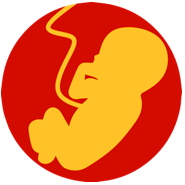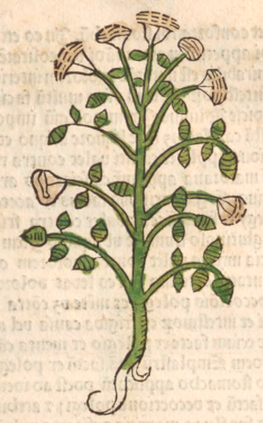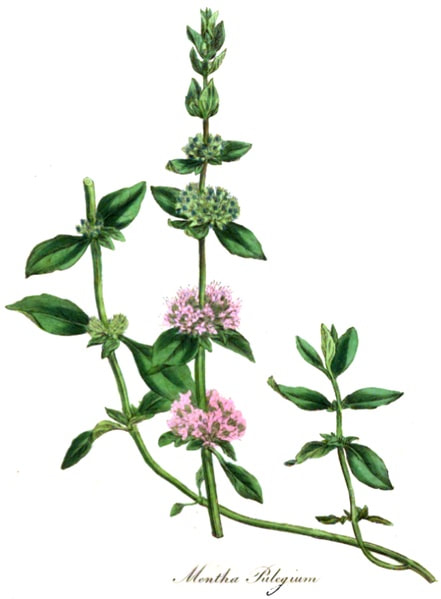Sentry Page Protection
Herbarius latinus, Petri, 1485
Herbarum Vivae Eicones, Otto Brunfels, 1530
Medical Botany, Woodville, 1810
Botanical name:
Mentha pulegium
Parts used:
Herb
Temperature & Taste:
Slightly Warm, dry. Pungent, Bitter
Classifications:
2A APERIENT. 2B ATTENUATER. 2F. PURIFYING. 2H. CARMINATIVE. 2J. RAREFYING
3C. ALEXIPHARMIC. 3G. EMMENAGOGUE. 3H. LACTAGOGUE. 3K. EXPECTORANT. 3M. ARTHRITICS
4a. CEPHALIC. 4f. SPLENETIC. 4i. UTERINE. 4k. ARTHRITIC
Mentha pulegium
Parts used:
Herb
Temperature & Taste:
Slightly Warm, dry. Pungent, Bitter
Classifications:
2A APERIENT. 2B ATTENUATER. 2F. PURIFYING. 2H. CARMINATIVE. 2J. RAREFYING
3C. ALEXIPHARMIC. 3G. EMMENAGOGUE. 3H. LACTAGOGUE. 3K. EXPECTORANT. 3M. ARTHRITICS
4a. CEPHALIC. 4f. SPLENETIC. 4i. UTERINE. 4k. ARTHRITIC
Uses:
1. Warms the Womb, Moves Qi, Promotes Menstruation:
-Amenorrhea, Dysmenorrhea (since Hippocrates)
-promote Labor, clear the Afterbirth, and expel a Dead Child.
-can be taken (in low doses) for 2–3 weeks before Childbirth to prepare the Uterus (Dr. Christopher)
-prevents and treats Postpartum disorders.
-Leukorrhea from Cold and Damp
2. Clears Phlegm, Stops Cough:
-‘cleanseth the Lungs, and cleareth the Breast from all Gross and thick humours’;
-‘being mingled with Honey and Salt, it voids phlegm out of the Lungs’ (Culpeper)
-Cough, Asthma, and Whooping Cough
3. Moves Qi, Settles Wind, Eases Pain, Resists Poison:
-Bile disorders, Biliousness (Lonicerus)
-Headache, Dizziness, Vertigo, Spasms, Nervousness, Hysteria, and Lethargy
-‘all pains of the head and sinews that come of a Cold cause... Drank with wine, it helps such as are bitten and Stung with Venomous beasts, and applied to the Nostrils with Vinegar, revives those that are fainting and swooning’ (Culpeper)
-‘the seed of Pennyroyal if it be smelled unto, is singular good to recover their tongue again who be Speechless’. (Pliny)
-strengthens the Eyesight.
4. Moves Qi, Regulates the Stomach, Eases Pain:
-cold stomach pain, ‘gnawing of the Stomach’ and ‘Pains of the Colic’.
-nausea, digestive weakness (Lonicerus)
-‘taken with water and vinegar to asswageth the inordinate desire to vomit, and the pains of the stomach’.
-Taken with Honey and Salt it ‘purges Melancholy by Stool’.
5. Promotes Urine, Clears Damp, Clears Stones:
-Edema, Fluid retention (Hippocrates)
-‘breaks and expels the Stone’; used for Gravel and Stones.
-Jaundice
6. Externally:
-applied with Salt to Liver or Spleen swelling.
-the fresh herb is bruised and infused in vinegar to cleanse foul Ulcers.
-boiled in wine, with honey and salt added, it is good for Toothache as well cold diseases of the Joints.
-applied with Honey, Salt and Vinegar to Spasms and Cramps.
-fresh herb stamped to a paste was applied to various aches and pains.
-the decoction is used as a wash for Itchy skin
-the decoction is applied with Barley Meal to burns.
-the ashes were used to strengthen the Gums.
Dose:
1. To move the Blood, promote Menstruation, calm the Liver and Resist Poison, the Decoction in Wine or the Tincture is preferred.
2. For the Lungs, the Honey sweetened Decoction, or the Honey Syrup is best.
3. Taken with Vinegar for the Liver and Epilepsy
4. It was also decocted in Milk.
Infusion or Brief Decoction: 2–5 grams (commonly 1 teaspoonful per cup);
Powder: 1–3 grams
Tincture (1:5): 2–4 mls, up to 5 mls. 2–3 times daily. 20 drop doses may be given in hot water every 3 hours to promote Menstruation;
Fluid Extract:: 1–2 mls.
Essence: 5–20 drops;
Essential Oil: ½–3 drops, taken on Sugar;
Juice: 1 spoonful.
Substitute:
Culpeper said of Dittany of Crete (Origanum dictamus) that it ‘possesses the virtues of Pennyroyal, but in a superior degree.’
1. To move the Blood, promote Menstruation, calm the Liver and Resist Poison, the Decoction in Wine or the Tincture is preferred.
2. For the Lungs, the Honey sweetened Decoction, or the Honey Syrup is best.
3. Taken with Vinegar for the Liver and Epilepsy
4. It was also decocted in Milk.
Infusion or Brief Decoction: 2–5 grams (commonly 1 teaspoonful per cup);
Powder: 1–3 grams
Tincture (1:5): 2–4 mls, up to 5 mls. 2–3 times daily. 20 drop doses may be given in hot water every 3 hours to promote Menstruation;
Fluid Extract:: 1–2 mls.
Essence: 5–20 drops;
Essential Oil: ½–3 drops, taken on Sugar;
Juice: 1 spoonful.
Substitute:
Culpeper said of Dittany of Crete (Origanum dictamus) that it ‘possesses the virtues of Pennyroyal, but in a superior degree.’
Main Combinations:
1. Obstructed Menstruation:
i. Pennyroyal with Mugwort
ii. Pennyroyal with Motherwort
iii. Pennyroyal with Tansy, Southernwood
iv. Pennyroyal with Oregano, Balm, St. John’s wort
v. Pennyroyal with Motherwort, Mugwort, Balm, Vervain
vi. Pennyroyal with Mugwort, Feverfew, Balm, Mallow (as in Decoction to Promote Menstruation)
vii. Pennyroyal with Balm, Sage, Mugwort, Calendula, Zedoary
viii. Pennyroyal extract, Hiera Picra (a compound) (equal parts), form pills. Make 4 grain pills. Dose: 2 pills at bedtime. (Valuable Herbal Prescriptions, late 1800's)
ix. Pennyroyal with Cyperus, Angelica, Valerian, Madder, Mugwort, Carrot seed, Cinnamon, Saffron (as in Emmenagogue Decoction)
2. To strengthen the Womb and promote Menstruation, Pennyroyal with Balm, Sage, Mugwort, Calendula, Cardamon and Zedoary
3. To Promote Birth, Pennyroyal with Savin, Mugwort, Saffron, Cinnamon, Myrrh (as in Powder to Facilitate Birth)
4. Carminative, Pennyroyal with Thyme, Rosemary, Fennel seed, Cumin, Cinnamon (as in Carminative Decoction)
5. 'Dutch Blood Purifier': Pennyroyal with Sage, Sarsaparilla, Sassafras, Figs
6. Neuropathy, Nerve diseases, Pennyroyal with Valerian, Peppermint, Balm (Dinand)
7. To purge Melancholy, Pennyroyal with Black Myrobalan, Oregano (as in Infusion for Melancholy)
8. Cold, Pennyroyal with Elder flower and Yarrow (BHP)
9. Cold Coughs, Pennyroyal with Horehound, Hyssop, Thyme, Fennel seed, Aniseed (as in Decoction for Cold Coughs of Nicholas)
10. Fainting, Pennyroyal and Peppermint with Vinegar (Pliny)
11. Apoplexy, Loss of Speech, Pennyroyal with Juniper, Sage, Saffron (as in Tincture of Juniper Compound)
12. Enema for Uterine pain, Pennyroyal with Mugwort, Camomile, Fenugreek, Linseed
Major Formulas:
Infusion of Senna and Flower with Spices (Mesue)
Decoction to Promote Menstruation (Wirtzung)
Emmenagogue Decoction (Riverius)
Decoction for the Womb (Schroder)
Syrup of Mugwort (Augustana)
Powder to Warm the Head (Bononiense)
Powder to Facilitate Birth (Renodeus)
Powder of Calamint Compound (Nicholas)
Electuary of Calamint (Galen)
Electuary of Hyssop (Diahyssopus) (Nicholas)
Electuary of Orris Root (Diaireos Salomonis) (Nicholas)
Cautions:
Not used during Pregnancy (although it has been used in the weeks before birth to prepare for birth, and has been used to promote labor).
Main Preparations used:
Conserve of the Tops, Distilled Water of the Herb, Distilled Oil
Not used during Pregnancy (although it has been used in the weeks before birth to prepare for birth, and has been used to promote labor).
Main Preparations used:
Conserve of the Tops, Distilled Water of the Herb, Distilled Oil
Click the Tabs above for more information on this Medicine
|
'Pennyroyal was in high repute among the ancients. Both Dioscorides and Pliny describe its numerous virtues. In Northern Europe it was also much esteemed, as may be inferred from the frequent reference to it in the Anglo-Saxon and Welsh works on medicine.
Gerarde considered the plant to be "so |
exceedingly well known to all our English nation" that it needed no description. In his time (circa 1590), it used to be collected on the commons round London, whence it was brought in plenty to the London markets. At the present day pennyroyal has fallen into neglect, and is not named in the British Pharmacopoeia of 1867. (Pharmacographia, Fluckiger & Hanbury, 1879)
|



